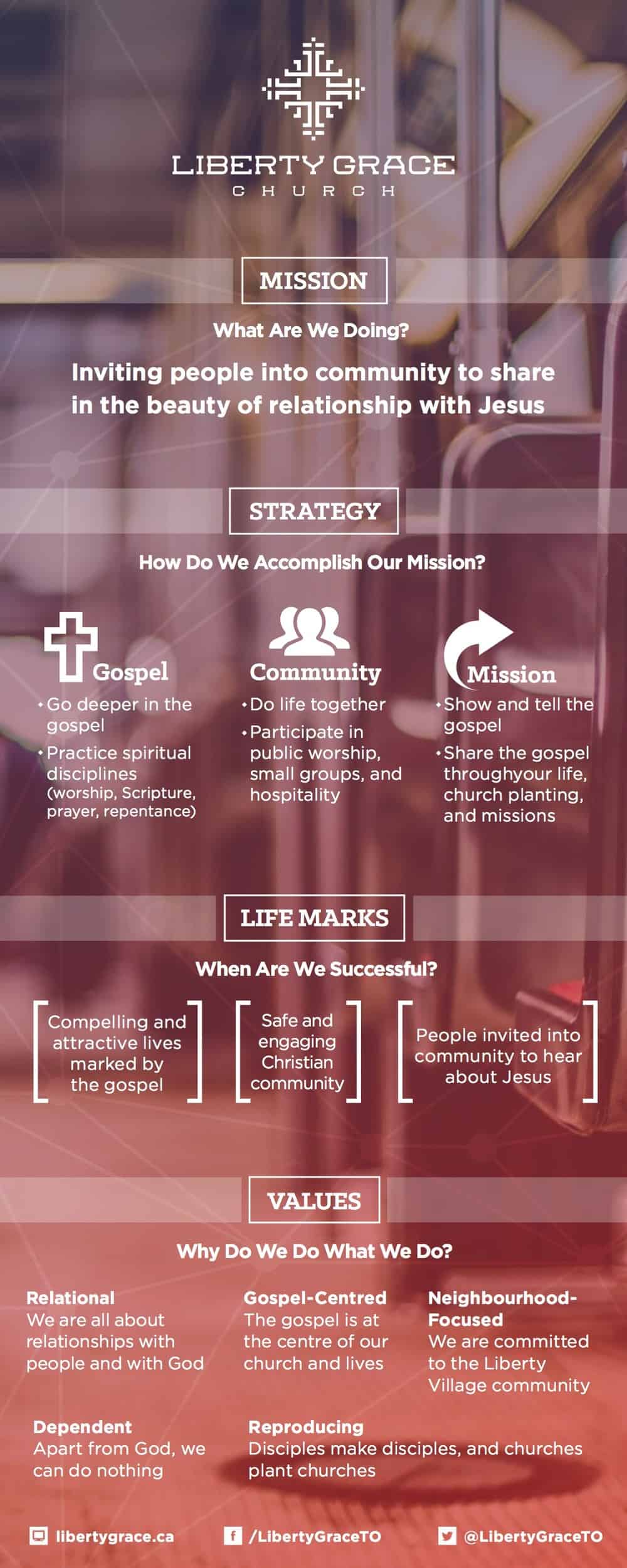Vision: Community (Romans 12:3-18)

Big Idea: Sunday mornings are good, but not enough. We also need to serve each other and to love each other.
Even though we are a new church, and even though we’re still small in number, we’re relaunching our church this month. We are going back to the very beginning and making sure that we’re clear on who we are, and what we’re all about. We’re doing this because it’s easy to forget.
When Charlene and I first got married, I was very clear what marriage was all about. But a couple of years in, I began to forget. She started to annoy me sometimes, to tell you the truth. I think I started to annoy her too. And so we had to go right back to the beginning and remind ourselves what marriage is all about. Remembering elevated us from seeing just today, and brought us back to the big picture. It gave us a picture of who we were supposed to be, by God’s grace. It reminded us of his calling.
It’s the same thing for us here as well. You are here because, at some point, you caught a vision of what a church plant could be. But it’s so easy to forget. It’s easy for me to forget! We need to remind ourselves who we’re supposed to be, by God’s grace.
So we want to relay the foundation, reset the DNA. We want to remind ourselves of why we’re here in the first place. Even better, I want to invite you into something. I want to invite you into something new and exciting. I’m not exaggerating when I say it could change your life, and it could change this community as well.
So last week we looked at the first part of our strategy: the gospel. It all begins here. We said that the gospel is the news that God made us and owns us, but that we rebelled against him. But God has initiated a rescue plan to save us through Jesus Christ, and all we have to do is to receive his finished work with empty hands, and then follow him. That’s the gospel. It’s central to our lives and our church. It’s not just how we become Christians, it’s how we grow in the Christian faith. We never outgrow the gospel.
As we said last week, we want to be a church that believes the gospel. But we want to be more than that. We also want to have a gospel culture. A church with gospel doctrine and a gospel culture is a beautiful and powerful thing. We looked at 1 John, and reminded ourselves that the gospel creates community, and that it also provides a safe place for sinful, messy people. If you weren’t here last week, let me tell you what this means: We want the gospel to shape the culture of this church, so that because we have Jesus in common, we have everything in common. The gospel creates a family, and that family is a place where we can drop the masks and stop pretending. We’re home.
We’ve given you a rack card today that explains our strategy. You’ll see that the gospel is the first piece of our strategy. We want you to go deeper in the gospel yourself, and to absorb a gospel doctrine and culture in your own life. As part of that, we want to encourage you to practice spiritual disciplines like worship, reading Scripture, praying, and repenting. We’ll return to these and help you unpack them in your lives. The result, as we do this, is that God will transform us through his Spirit so that are lives are compelling and attractive, and marked by the gospel. That’s what we’re aiming for in our lives.
So that’s the gospel. We will never move beyond it. We will keep returning to it over and over. It’s not the ABC’s but the A to Z of the Christian life.
But today we’re coming to the second part of our strategy: community. Here’s the problem. What do you think of when you think of church? We usually think of a couple of things, and here’s the first:
Building — When you ask most people about a church, they automatically think about a building. When we were kids, we learned the rhyme: “Here’s the church, here’s the steeple. Open the doors, and see all the people.” It’s ridiculous, because although we think of church as a building, the true biblical meaning of church is about as far from building as you can get. The early Christian church had no buildings. The early Christians were often persecuted and, as a result, they often met in secret in homes.There’s nothing wrong with having a building, as we do, but this is not the church. When we see this as the church, then church becomes compartmentalized and segmented as a tiny part of our lives.
But there’s another way that we usually think of church:
Service — A lot of people think of church as a worship service. For them, church means attending a service once a week. It involves sitting in rows and singing, and listening to a sermon. I actually think that worship services are important. Public worship and proclamation are important — but they are not what it means to be the church!
In a book called The Trellis and the Vine, Colin Marshall and Tony Payne make a very good point:
Sunday sermons are necessary but not sufficient…Sermons are needed, yes, but they are not all that is needed. Let’s be absolutely clear: the preaching of powerful, faithful, compelling biblical expositions is absolutely vital and necessary to the life and growth of our congregations….Clear, strong, powerful public preaching is the bedrock and foundation upon which all other ministry in the congregation is built. The sermon is the rallying cry…
But then they quote Peter Adam, who says:
…While preaching…is one form of the ministry of the Word, many other forms are reflected in the Bible and in contemporary Christian church life. It is important to grasp this point clearly, or we shall try to make preaching carry a load which it cannot bear; that is, the burden of doing all that the Bible expects from every form of ministry of the Word.
Here’s the deal. If church = Sunday service for you, you’re not getting the whole package. You’re missing a huge part of what it means to be the church. You’re getting the all-inclusive without the meals. You’re getting the burger without the beef. It’s not enough. Church was designed to be more than what you’re experiencing so far. It’s not that the service is unimportant, it’s just that it’s designed to be more.
So let’s get practical. What’s needed beyond the worship service? I want to notice two things from Romans 12 that we need on top of coming together for public worship. It means that we make two practical commitments.
1. I am here to serve
Romans 12:3-8 makes one main point: everyone in the church is needed to serve everyone else. In other words, we all need each other! That’s why Paul begins in verse 3 the way he does: “For by the grace given to me I say to everyone among you not to think of himself more highly than he ought to think, but to think with sober judgment, each according to the measure of faith that God has assigned” (Romans 12:3). Here’s the problem. When we overestimate ourselves, we think we don’t need the ministry of other believers. Paul calls out what’s behind our thinking that we don’t need the ministry of the body: arrogance.
As you know, the Jays have been playing really well lately. Third baseman Josh Donaldson is having an exceptionally good season. He’s on pace to have the best individual season by a position player in Jays’ history. Imagine today, as they’re playing Boston, if Donaldson said to the team, “Hey guys, I’m frontrunner for American League MVP. You guys take the day off. I’ve got this.” That would be extremely arrogant. We get that. Donaldson needs what the others on the team can do, and so do we. We need the ministry of others.
What does this look like? Verses 6 to 8 tell us:
Having gifts that differ according to the grace given to us, let us use them: if prophecy, in proportion to our faith; if service, in our serving; the one who teaches, in his teaching; the one who exhorts, in his exhortation; the one who contributes, in generosity; the one who leads, with zeal; the one who does acts of mercy, with cheerfulness. (Romans 12:6-8)
Paul says that all of us have gifts. The Holy Spirit empowers us in such a way that we’re able to help strengthen the church and help it to flourish. We all have a role. Every one of us is needed. He lists two broad categories: speaking gifts (prophesying, teaching, and encouraging), and serving gifts (serving, contributing, leading, and showing mercy).
God’s glory is revealed through his people — not just through some of his people, but in the diversity of gifts that he’s given his people. This means that we need your ministry. We need what God has prepared you to do in this church. We need more than the ministry of the few to the many; we all need what God has put you here to do. I like how Ed Welch puts it:
We were meant to walk side by side, an interdependent body of weak people. God is pleased to grow and change us through the help of people who have been re-created in Christ and empowered by the Spirit. That is how life in the church works. (Side by Side)
Let’s get very practical. What does this look like? It means that we need community so that we have the time to serve each other. We need enough time so that we can encourage each other, teach each other, contribute to each other in practical ways, and show mercy to each other. That’s more than a meeting. It’s a way of life.
This is the way the church moves forward— through mutual love and care. Such expression of love was less obvious in the Old Testament, when people relied on kings, leaders, and prophets, but when the Spirit was given at Pentecost— everything changed. Suddenly, ordinary people had extraordinary impact. (Ed Welch)
That’s the first commitment that we must make as we come together. I am here to serve. That’s very different from the attitude, “I’m here to be served.” God has brought you here because you have a contribution to make. The Lord has given spiritual gifts to every Christian in this room. Find your gift. Embrace it by faith. Use it with the strength that God supplies, so that God will get the glory and you and your church will get the joy. I am here to serve, and you are too.
There’s one other practical commitment I find in this passage:
2. These people are here to be loved.
Serving each other is one thing. Paul ups the ante in verses 9 and on:
Let love be genuine. Abhor what is evil; hold fast to what is good. Love one another with brotherly affection. Outdo one another in showing honor. Do not be slothful in zeal, be fervent in spirit, serve the Lord. Rejoice in hope, be patient in tribulation, be constant in prayer. Contribute to the needs of the saints and seek to show hospitality. (Romans 12:9-13)
Rejoice with those who rejoice, weep with those who weep. Live in harmony with one another. Do not be haughty, but associate with the lowly. Never be wise in your own sight. (Romans 12:15-16)
Here’s what Paul says church life looks like: genuine love. Treating each other like family. Outdoing each other in showing honor. Never hesitating in our eagerness to love each other. It means praying for each other, contributing to each other’s financial needs, and inviting strangers into our homes. It means identifying with each other’s joys and sorrows. It means that we never look down on another person in the church, and that we never think more of ourselves than we do of anyone else.
Who wouldn’t want to be part of a community like that? All of these are the practical outworking of what Paul said in verse 9: “Let love be genuine.” If you get that right, everything else flows out of that. God commands what we should feel for each other. And God shows us what this would look like if we lived it out.
In her off-beat memoir, journalist and writer Heather Havrilesky reminds us how community (whether in a family or a church family) implies carrying one another’s burdens. Havrilesky writes:
We weren’t meant to suffer alone! We weren’t meant to … escape the indignity and frustration of asking for help, for needing help, from someone who might not always enjoy giving it, someone who gets on our nerves, who has never made much sense to us, someone whom we break down and bicker with occasionally. We were meant to lean on each other, as messy and imperfect as that can be, to be capable when we can, and to allow the world to take care of us when we can’t. It won’t be all bad. Or it will be. But at least we’ll have each other.
That’s what Paul is talking about. He’s talking about breaking through the barrier of polite relationships to something much deeper — to genuine love. He’s not talking about sitting in rows. He’s talking about turning our chairs towards each other, and opening our homes and our lives.
And it’s a beautiful thing. By God’s grace, it can happen. By God’s grace, it must happen. It’s simple, but it will take God’s power to keep these two commitments: I am here to serve, and these people are here to be loved.
I have to confess that there was a time that I didn’t think this was really possible. But now I not only think it’s possible. In fact, I was reading a book on this one time, and I put it away because I thought it was a pipe dream. Not anymore. I think it’s absolutely necessary. It’s what God wants for our church. I’m all in on this. This is the type of community that God wants us to have at Liberty Grace Church.
You may have never realized how crucial the local church is to your walk with Christ.
We think that this kind of living, this kind of biblical Christianity, requires small groups. We believe that this is pie-in-the-sky theory if the we do not have a web of deepening, regularly-nurtured personal relationships. We need a way for Romans 12:3-18 to become a regular, personal, relational reality.

You’ve been given a rack card today. It illustrates our mission and our strategy as a church. I want you to keep this card. I’d encourage you to stick it on your fridge, or tuck it in your Bible as a bookmark, or download a copy for your phone or tablet. It’s so important.
Our whole strategy as a church is here. We’ve already covered the first: that we go deeper in the gospel, and that we practice spiritual disciplines by God’s grace, so that our lives are compelling and attractive, marked by the gospel.
Today we are at the second strategy. It’s the strategy of community: to do life together, to participate in public worship, small groups, and hospitality. The result will be safe and engaging Christian community. All of this is a reflection of the gospel. It’s only possible because we see what Jesus has done for us, and because our lives are being transformed as a result.
I have two ways for you to respond.
First: I invite you to memorize Romans 12:10 with me: “Love one another with brotherly affection. Outdo one another in showing honor” (Romans 12:10). Let’s internalize this and let it get under our skin.
Second: This week, you will receive an invitation to a small group, starting the week after next. It will be messy at the beginning. We’re just beginning to figure this stuff out. But by God’s grace, we’re going to do this. I want you to respond, and to join a small group community in which you can live out these two practical commitments: I am here to serve, and these people are here to love.
In his book The Pastor, Eugene Peterson describes his wife Jan’s understanding of what it means to be a pastor’s wife. As I read Peterson’s words, I was struck with how apt the description was not only for pastor’s wives but for all Christians as they enter fully into the life of the body of Christ.
And so, I would like to modify Peterson’s words slightly and substitute church member for pastor’s wife. See if you don’t think this is a good description of what life in the church should be:
Being a church member is a vocation, a way of life. It means participation in an intricate web of hospitality, living at the intersection of human need and God’s grace, inhabiting a community where men and women who don’t fit are welcomed, where neglected children are noticed, where the stories of Jesus are told, and people who have no stories find that they do have stories, stories that are part of the Jesus story. Being a church member places us strategically yet unobtrusively at a heavily trafficked intersection between heaven and earth.
That’s where I want to live. That’s what I want this church to feel like. Will you join me?





